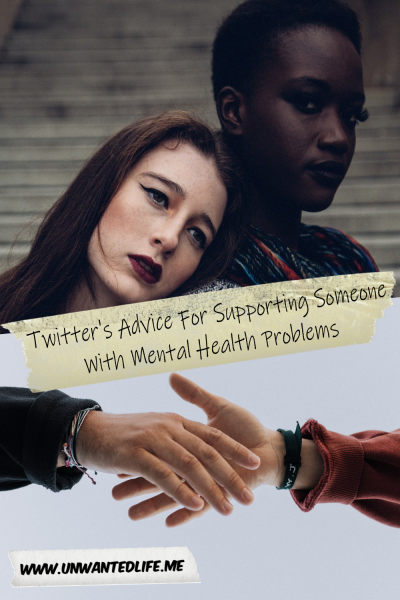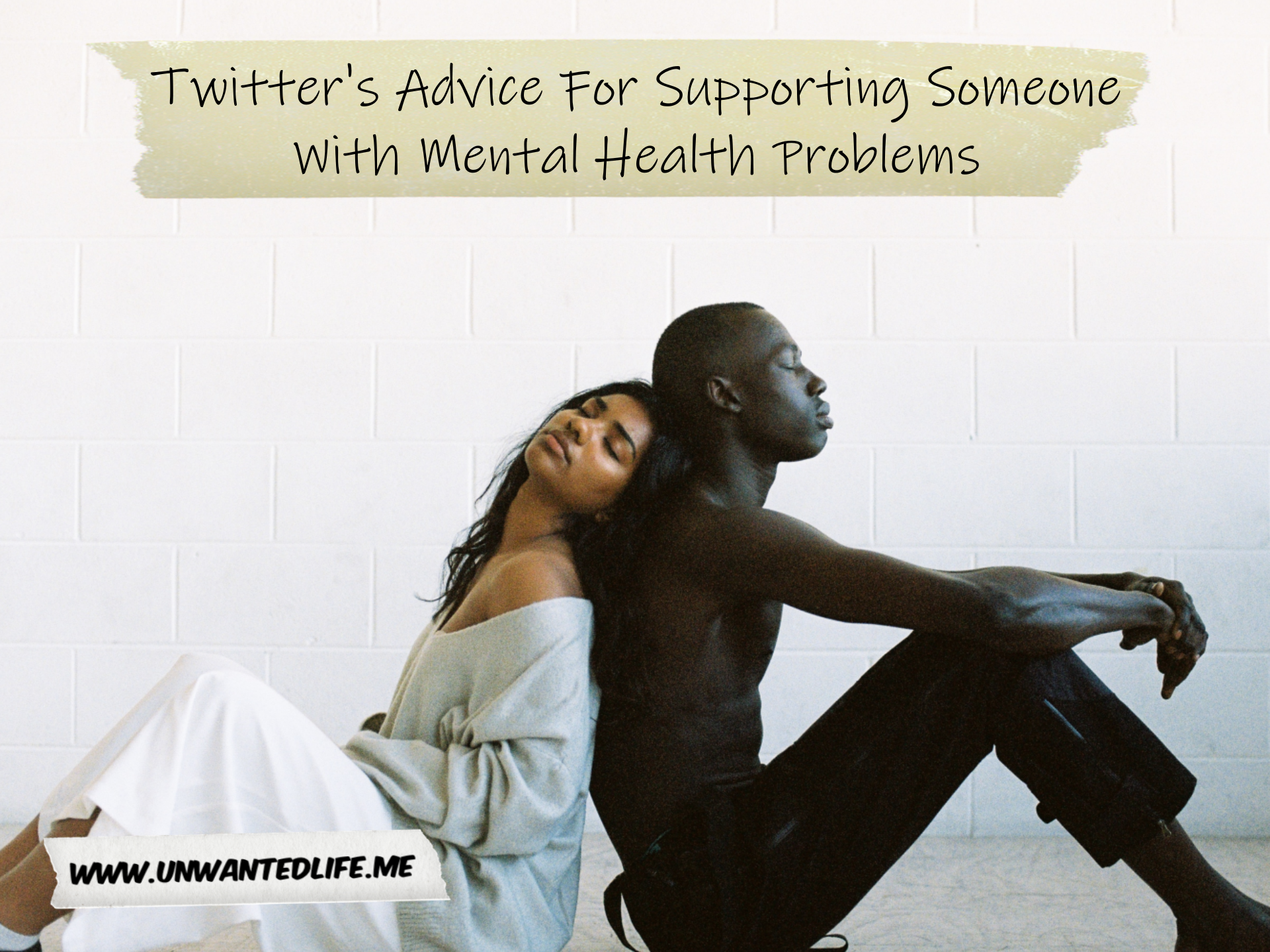I decided to pose another question to Twitter to further the cause of de-stigmatising mental health. I wanted to know what Twitter users would offer in the way of advice for supporting someone with mental health problems. I did that by asking the following question:
What advice would you give to someone trying to support a loved one with mental health problems?
Hopefully, you’ll find the suggestions made by my fellow Twitter users useful if you need them for your own situation. Or, alternatively, as something you can recommend to someone else who has found themselves in such a situation.
1.
My first reply came from @dibi_dibi_ who provided some good advice.
Just listen sometimes it isn't always about talking and talking, the person might just need a listening ear to pour out their emotions .
— Abbey? (@abbeyschronicle) March 7, 2019
Just listen sometimes it isn’t always about talking and talking, the person might just need a listening ear to pour out their emotions
2.
@CrystalsTravels made a very important point, caregiver burnout is a very real problem. Self-care is just as important as the support you offer someone else in need.
Get outside help. Caregiver burnout is very real. Take care of yourself first. I see so many people who make themselves sick taking care of others.
— Been There With Kids (@CrystalsTravels) March 9, 2019
Get outside help. Caregiver burnout is very real. Take care of yourself first. I see so many people who make themselves sick taking care of others.
3.
An interesting point was shared by @osian_hughes_.
Always a difficult question. The automatic thing to do, I think, is to give advice to them, trying to prop them up with positive talk.
— Osian Hughes (@osian_hughes_) March 11, 2019
From experience, the best thing you can do is listen. Let them talk, let them get it off their chest, being there, the only thing you can do.
Always a difficult question. The automatic thing to do, I think, is to give advice to them, trying to prop them up with positive talk.
From experience, the best thing you can do is listen. Let them talk, let them get it off their chest, being there, the only thing you can do.
4.
@nevhaweater also took the time to provide insight on how to support someone suffering from mental health problems.
Ask them what they're experiencing; Ask them what they need. Then it's #TimeToListen https://t.co/uiEQrLLb6X
— Nancy Vaillancourt (@nevhaweater) March 11, 2019
Ask them what they’re experiencing; Ask them what they need. Then it’s #TimeToListen
5.
An experience-based reply came from @JulieJulie726 who also shared what kind of help they would have benefited from, personally.
As someone caring for my son with mental health problems it is not advice I want but understanding, support and practical help
— Julie Thompson RN (@JulieJulie726) March 11, 2019
As someone caring for my son with mental health problems it is not advice I want but understanding, support and practical help
To which I asked what kind of practical help would help someone in your situation.
Navigating the benefit system, befriending etc
— Julie Thompson RN (@JulieJulie726) March 12, 2019
Navigating the benefit system, befriending etc
6.
@shaziaparv made a point about how useful it can be to seek help from support groups for the carer.
For someone looking after someone listen…encourage them to use groups that support other Carers such as #MIND and many others ..Remind them they are important in all this too and they doing great.All depends what they talk about and what concerns they have.
— Shazia Parveen? (@shaziaparv) March 12, 2019
For someone looking after someone listen…encourage them to use groups that support other Carers such as #MIND and many others ..Remind them they are important in all this too and they doing great.All depends what they talk about and what concerns they have.
7.
Something we can all do with a little more of was suggested by @EckeardB.
Have a lot of patience
— Barry D. Eckeard (@EckeardB) March 13, 2019
Have a lot of patience
8.
A very good point to remember was made by someone who’s now deactivated their account.
https://twitter.com/henson_ss/status/1105718967153262597?s=19
What ever happens, it isn’t your fault
9.
Unfortunately, this person has now deactivated their account, but they replied with something that is very useful if we’re trying to support a loved one.
https://twitter.com/butterflyinwai1/status/1105746918301274112?s=19
Unconditional love always

10.
@talkingcl offers advice coming from the perspective of the person suffering from mental health who needs support.
If we lash out, or distance ourselves from you. We never mean to hurt you. And we love you more than you'll ever know.
— Stephen Gillatt (@talkingcl) March 13, 2019
Your patience and support priceless.
If we lash out, or distance ourselves from you. We never mean to hurt you. And we love you more than you’ll ever know.
Your patience and support priceless
11.
@ItsMyCrazyBeau1 provides some advice based on their own experience of trying to help a loved one.
I would have to say to take it slow, be patient and to never give up. My nephew is autistic and the parents don't believe that so I work with him to help him understand what is going on and how to handle things in a different way.
— It's My Crazy Beautiful Life (@ItsMyCrazyBeau1) March 13, 2019
I would have to say to take it slow, be patient and to never give up. My nephew is autistic and the parents don’t believe that so I work with him to help him understand what is going on and how to handle things in a different way
12.
Similar to the advice about watching out for carer burnout, @lovemetreatme suggests making self-care a priority.
Oh man that can be tough. Selfcare would be my top answer as it is very difficult to care for anyone unless you yourself are taken care of. I would suggest implementing some type of selfcare plan so the person in question does not become mentally drained themselves
— LoveMeTreatMe (@lovemetreatme) March 13, 2019
Oh man that can be tough. Selfcare would be my top answer as it is very difficult to care for anyone unless you yourself are taken care of. I would suggest implementing some type of selfcare plan so the person in question does not become mentally drained themselves
13.
Seeking professional support, as suggested by @Rodders991, can be an important coping strategy to help avoid carer burnout and engage in self-care.
https://twitter.com/Rodders991/status/1105904217871536129?s=19
I’m not a professional, but I’d make the GP first port of call.
If you think it’s an emergency then dial 999
Apart from that, just be there for them
#bless
14.
This suggestion was made from a protected tweet account. Thus I’m sharing their advice minus their Twitter handle.
I would say… Reassurance that you’re there for them. Keep questions open ended, for example ask “Why don’t you tell me how you’re feeling?” Instead of “I can see you’re feeling low”. Offering help to seek professional support too is massive. Most important…. LISTENING
15.
Another good piece of advice about self-care came from @PagePlacePlate.
Look after yourself as well as them – you can't support if you too are unwell. Don't pressure them, but make sure they know you are there for them.
— (On hiatus) | Pages Places & Plates (@PagePlacePlate) March 14, 2019
Look after yourself as well as them – you can’t support if you too are unwell. Don’t pressure them, but make sure they know you are there for them
16.
A very good point was made by @sarabricknell.
You don't have to "fix" anything. JUST BE THERE and keep being there.
— Sara (@sarabricknell) March 17, 2019
You don’t have to “fix” anything. JUST BE THERE and keep being there.

17.
As @DonnaHu83907965 stated in their reply, listening is very important.
To listen, sometimes if a person feels listened to, it can help them tremendously.
— Donna Hudson (@DonnaHu83907965) March 17, 2019
To listen, sometimes if a person feels listened to, it can help them tremendously
18.
@AtlanticKaren also suggested patience, which is a very important skill to practice in such situations.
Be patient. That’s for anyone suffering or trying to help.
— Karen F (@AtlanticKaren) March 17, 2019
Be patient. That’s for anyone suffering or trying to help
19.
Listening was suggested again as to what to do when trying to help a loved one. This time it was suggested by @MarkDB22.
https://twitter.com/MarkDB22/status/1107454179314790400?s=19
Be there. Listen. Be as involved as the loved one wants you to be and keep a watchful eye for their well being
20.
@lizzieeh26 made an important point.
Don’t judge, and remember you don’t always need to give solutions
— Lizzie Humphreys (@lizzieeh26) March 17, 2019
Don’t judge, and remember you don’t always need to give solutions
21.
A thoughtful suggestion care from @elizabeth_nutt.
Let them know how much you love them and that you will always love them, no matter what and no matter what lies their mental illness isntelling them re them not being worthy of your love. Make sure they know daily they are worthy of and deserve your love and support
— Elizabeth Nutt (@elizabeth_nutt) March 17, 2019
Let them know how much you love them and that you will always love them, no matter what and no matter what lies their mental illness isntelling them re them not being worthy of your love. Make sure they know daily they are worthy of and deserve your love and support
22.
@themindberg also suggested self-care as being important when trying to support someone else.
I would say "look after yourself, whatever that means to you- you cannot support someone if your health is failing". Look for support 4 the loved one (group, dr., 1-2-1) but also for the supporter.
— theMINDBERG (@themindberg) March 18, 2019
Just as you don't want loved one to be alone in it, don't you be alone in it.
I would say “look after yourself, whatever that means to you- you cannot support someone if your health is failing”. Look for support 4 the loved one (group, dr., 1-2-1) but also for the supporter. Just as you don’t want loved one to be alone in it, don’t you be alone in it
23.
@Sookie_smile was the fifth person to suggest listening as the kind of advice they’d offer to someone trying to support a loved one with a mental health problem.
Listen and try to understand. Be patient, kind and calm. Make them feel safe in the fact that they can open up to you. Don’t tell them what YOU think they feel because they (for the most part) know what they feel. Don’t judge. Treat them the same way as you want to be treated ? https://t.co/ZBxC8Btifm
— lisa ? (@Sookie_smile) March 18, 2019
Listen and try to understand. Be patient, kind and calm. Make them feel safe in the fact that they can open up to you. Don’t tell them what YOU think they feel because they (for the most part) know what they feel. Don’t judge. Treat them the same way as you want to be treated
24.
@carsonbohdi suggestion is a very important part of self-care and avoiding burnout.
set boundaries, listen if they chose to share with you, but also be an example of someone putting their needs first – don't just take shit b/c they're ill… but don't turn on them for being ill either
— Carson (@carsonbohdi) March 24, 2019
set boundaries, listen if they chose to share with you, but also be an example of someone putting their needs first – don’t just take shit b/c they’re ill… but don’t turn on them for being ill either
25.
@RobynMcShane points out that mental health issues are hard enough to deal with already, so try not to add to that.
Be patient. People who have mental health issues are hard enough on themselves…we need others to be patient with us when we can't be patient with ourselves
— Robyn McShane (@RobynMcShane) March 25, 2019
Be patient. People who have mental health issues are hard enough on themselves…we need others to be patient with us when we can’t be patient with ourselves
26.
Love and acceptance are the most important pieces of advice that @ABSSMS66 could suggest.
Just love them as they are and accept the place they are in. Listen with an open mind and be prepared to hear regardless of how painful you may perceive it to be.
— ABS.SMS (@ABSSMS66) March 26, 2019
Just love them as they are and accept the place they are in. Listen with an open mind and be prepared to hear regardless of how painful you may perceive it to be
27.
@NeverAloneNAPS provide a shortlist of potential ways you can better support a loved one.
Take a course like mental first aid. If they get help like a CBT course then check it out so you can help. Once in a while just tell them you are there for them. When they are lost in thought offer a positive distraction. Try to get to local peer support. Identifying with others
— N.A.P. S. YYC (@NeverAloneNAPS) March 26, 2019
Take a course like mental first aid. If they get help like a CBT course then check it out so you can help. Once in a while just tell them you are there for them. When they are lost in thought offer a positive distraction. Try to get to local peer support. Identifying with others

My Advice
Lastly, what would I, @UnwantedLife_Me, suggest people do if they find themselves with a loved one suffering from a mental health problem?
As a lot of people have suggested, patience is important in trying to support someone with mental health problems. This is also a strategy I’d suggest because mental health problems can take a very long time to work through. I know my partner seems to have a pretty big supply of patience when it comes to me and my mental health problems.
Listening was another suggestion that was made a lot by my fellow Twitter users. Listening and patience go together like a hand in a glove. They’re best used together to properly support someone with mental health problems. However, they can be skills that are hard to use because we either want to hurry up and fix the person or we just don’t understand what’s going on.
In that regard, I’d also remind them that it’s not their job to fix their loved one, but that you can be a part of their journey to getting better.
I would also add that it’s important to avoid using certain phrases, like “you just need to get over it” which does more harm than good. Making comparisons with other people, even if they do have it worse, still isn’t a good idea. It doesn’t matter if someone does or doesn’t have it worse than you. What matters is how it impacts you as an individual.
Lastly for my suggestions, just try your best to be supportive and understanding. But also be supportive and understanding of yourself and your own needs as well.
Thanks to everyone who took the time to reply to my question on Twitter: even though you didn’t know you’d be contributing to one of my blog’s articles.
If you found any of these lovely Twitter people’s suggestions useful, why not swing by their Twitter pages and let them know?
As always, leave your feedback in the comments section below. Also, feel free to share your experiences of supporting someone with mental health or being supported with your mental health in the comments section below as well. If you want to stay up-to-date with my blog, then sign up for my newsletter below. Alternatively, get push notifications of new articles by clicking the red bell icon in the bottom right corner.
Lastly, if you’d like to support my blog then you can make a donation of any size below also. Until next time, Unwanted Life readers.
Support


There’s a great selection of advice here – thank you for featuring me but also for compiling this all! Sometimes as a carer it’s easy to forget this sort of stuff as you get so wrapped up in what’s going on, so it’s nice to have a reminder every so often.
so true. Hopefully you’ll also feature on my next one
All wonderful pieces of advice. Thanks for the feature xx
Thanks for providing me with your insight
Such a wonderful post, full of excellent information! Thank you for putting this together and sharing 😀
– Nyxie
This is such a good idea. I am a Twitter addict anyway, but I have never thought of using it to fuel a post. Everyone gave such good advice too. Good job!